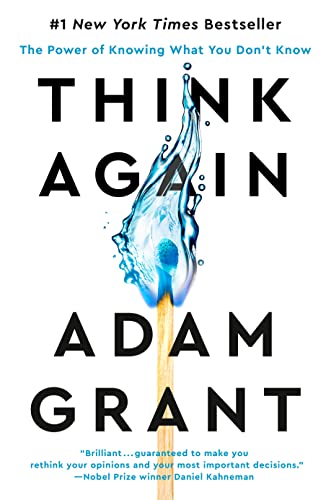
1
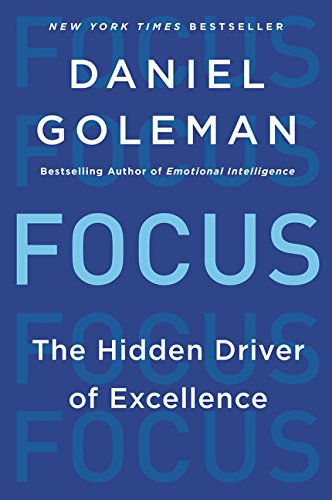
2
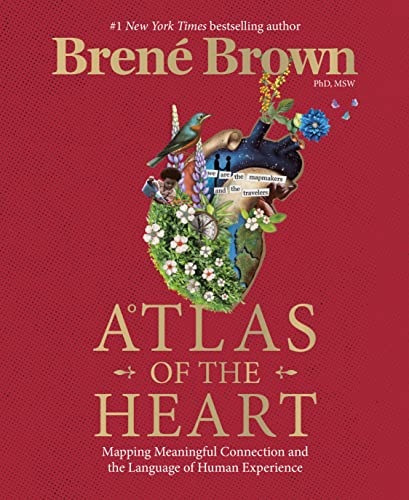
3
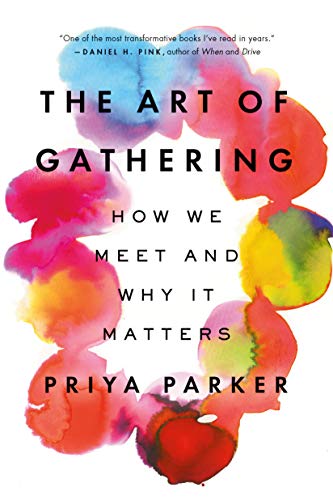
4
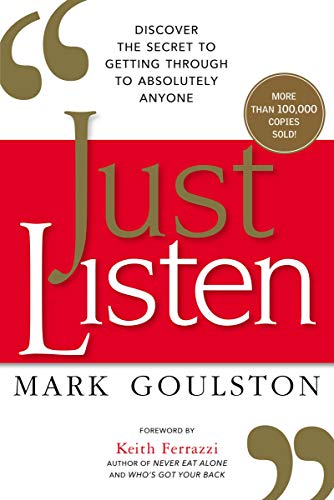
5
To help usher in the new year with some fresh perspectives, I want to share some books that changed my life. When the challenges just keep coming, learning new ways of thinking and behaving can help keep our spark lit, our spirits up, and our attention on the things that truly matter.
1
Many people experienced loss, grief and exhaustion because of the global pandemic, and it continues as new variants emerge. For me, the past two years have harbored unknowns, close calls, big changes and opportunities to learn new things. In the absence of familiar and normal, I had to rethink much. Picking up “Think Again” was one of the best things I did. It’s easy to default to “how we’ve always done it” even when we recognize profound change is needed. Over time, rigidity settles into our beliefs, habits, actions and thought patterns. Adam Grant challenges us to rethink our assumptions, keep our minds open, resist groupthink and give ourselves the gift of curiosity. He urges us to think more like scientists and less like politicians, prosecutors and preachers. Throughout the book, Grant uses scenarios that reflect America’s narrow, two-sided discourse on complex issues and provides strategies on how to “think again.” Reading this book changed how I think about what’s in front of me, the challenges I face, the beliefs I hold and the things and people who deserve my time, energy and attention. I now choose to ask more questions and bring in more information from a variety of sources to broaden my perspective and strengthen my growth mindset. My biggest takeaway? We don’t know as much as we think we do. It’s far better to be someone who’s always a work in progress than someone who can never admit to being wrong.
2
Have you ever felt too scattered to be effective – at life, relationships, work, self-care routines? Do you feel constantly sidelined by distractions? According to Harvard psychologist Daniel Goleman, raising your level of focus is key to success in any domain in life. “Focus” lays out some fascinating research and science around the study of attention. But what I appreciated most were the practical strategies to help strengthen my ability to pay attention to the things that matter most to me. In our busy lives, it’s nice to know that we’re not alone in feeling this way. So much of our world is designed to grab precious pieces of our headspace. I found it helpful to be reminded of the importance of being present and locked in on what I value most. 2022 is going to be a whirlwind. Stay focused my friends.
3
Being human is complicated. We have all endured A LOT since March 2020, and many of us are walking around like zombies without the tools to express or process what we’ve been experiencing. “Atlas of the Heart” gives us those tools – and the language – to share and steward our stories with each other. Dr. Brené Brown’s research identifies 87 different emotions and experiences that define what it means to be human. EIGHTY-SEVEN! That’s a far stretch from the three emotions people typically identify – happy, sad and mad. I wasn’t raised in an environment where we talked about our feelings. Understanding my emotions is still relatively new for me and I often struggle with being able to articulate what I’m experiencing. So let me be clear: this book is challenging me big time, and simultaneously unlocking areas in my work and life that had previously felt stuck. If this pandemic has taught us anything, it’s that we need each other. “Atlas of the Heart” gives us a map for navigating these rough waters together.
4
I don’t know about you, but gatherings changed a lot for me these last two years. Conversations I’d previously always had in person I was having over Zoom, meetings we’d never had before were happening every week, and conferences we’d always held suddenly felt purposeless. I read Parker’s book in January 2021 and was immediately drawn in by her synthesis of what I’d been experiencing in my own gatherings – what was working and what was NOT working, and why. Not only that, Parker provided insightful and practical ways for me to analyze various gatherings in my life, figure out why they weren’t quite working and make small yet meaningful shifts to increase their impact. Based on this new perspective, I made changes to our team meetings, sessions for Holdsworth’s Campus Leadership Program and even my mom’s memorial service (she died of cancer in 2020). I’d recommend this book to anyone looking to infuse your gatherings with more joy, purpose and life.
5
One of the most underrated skills in my profession as a communicator is listening. A good communicator doesn’t just deliver a message, drop the mic and walk away. She checks for understanding by inviting questions and feedback – and does a lot more listening than talking. If everyone invested a little more time sharpening their listening skills, we’d all enjoy stronger and more authentic relationships. “Just Listen” offers practical advice on the art and science of listening, including how to make people feel important and how to master the skill of being genuinely interested and not just acting interested. (Yes, it can be done!) One of the most impactful strategies I use on a regular basis is how to quickly regulate my emotions in stressful situations so that I can be as clear-headed as possible (which makes me a better listener and problem-solver). Goulston writes that when you do this well, “you go from being fixated on the way you are convinced the world should or shouldn’t be, but never will be, to being ready to deal with the world the way it is.” I have a hunch there’s a lot we all want to change in this world, and it starts with our ability to just listen.

1
Many people experienced loss, grief and exhaustion because of the global pandemic, and it continues as new variants emerge. For me, the past two years have harbored unknowns, close calls, big changes and opportunities to learn new things. In the absence of familiar and normal, I had to rethink much. Picking up “Think Again” was one of the best things I did. It’s easy to default to “how we’ve always done it” even when we recognize profound change is needed. Over time, rigidity settles into our beliefs, habits, actions and thought patterns. Adam Grant challenges us to rethink our assumptions, keep our minds open, resist groupthink and give ourselves the gift of curiosity. He urges us to think more like scientists and less like politicians, prosecutors and preachers. Throughout the book, Grant uses scenarios that reflect America’s narrow, two-sided discourse on complex issues and provides strategies on how to “think again.” Reading this book changed how I think about what’s in front of me, the challenges I face, the beliefs I hold and the things and people who deserve my time, energy and attention. I now choose to ask more questions and bring in more information from a variety of sources to broaden my perspective and strengthen my growth mindset. My biggest takeaway? We don’t know as much as we think we do. It’s far better to be someone who’s always a work in progress than someone who can never admit to being wrong.

2
Have you ever felt too scattered to be effective – at life, relationships, work, self-care routines? Do you feel constantly sidelined by distractions? According to Harvard psychologist Daniel Goleman, raising your level of focus is key to success in any domain in life. “Focus” lays out some fascinating research and science around the study of attention. But what I appreciated most were the practical strategies to help strengthen my ability to pay attention to the things that matter most to me. In our busy lives, it’s nice to know that we’re not alone in feeling this way. So much of our world is designed to grab precious pieces of our headspace. I found it helpful to be reminded of the importance of being present and locked in on what I value most. 2022 is going to be a whirlwind. Stay focused my friends.

3
Being human is complicated. We have all endured A LOT since March 2020, and many of us are walking around like zombies without the tools to express or process what we’ve been experiencing. “Atlas of the Heart” gives us those tools – and the language – to share and steward our stories with each other. Dr. Brené Brown’s research identifies 87 different emotions and experiences that define what it means to be human. EIGHTY-SEVEN! That’s a far stretch from the three emotions people typically identify – happy, sad and mad. I wasn’t raised in an environment where we talked about our feelings. Understanding my emotions is still relatively new for me and I often struggle with being able to articulate what I’m experiencing. So let me be clear: this book is challenging me big time, and simultaneously unlocking areas in my work and life that had previously felt stuck. If this pandemic has taught us anything, it’s that we need each other. “Atlas of the Heart” gives us a map for navigating these rough waters together.

4
I don’t know about you, but gatherings changed a lot for me these last two years. Conversations I’d previously always had in person I was having over Zoom, meetings we’d never had before were happening every week, and conferences we’d always held suddenly felt purposeless. I read Parker’s book in January 2021 and was immediately drawn in by her synthesis of what I’d been experiencing in my own gatherings – what was working and what was NOT working, and why. Not only that, Parker provided insightful and practical ways for me to analyze various gatherings in my life, figure out why they weren’t quite working and make small yet meaningful shifts to increase their impact. Based on this new perspective, I made changes to our team meetings, sessions for Holdsworth’s Campus Leadership Program and even my mom’s memorial service (she died of cancer in 2020). I’d recommend this book to anyone looking to infuse your gatherings with more joy, purpose and life.

5
One of the most underrated skills in my profession as a communicator is listening. A good communicator doesn’t just deliver a message, drop the mic and walk away. She checks for understanding by inviting questions and feedback – and does a lot more listening than talking. If everyone invested a little more time sharpening their listening skills, we’d all enjoy stronger and more authentic relationships. “Just Listen” offers practical advice on the art and science of listening, including how to make people feel important and how to master the skill of being genuinely interested and not just acting interested. (Yes, it can be done!) One of the most impactful strategies I use on a regular basis is how to quickly regulate my emotions in stressful situations so that I can be as clear-headed as possible (which makes me a better listener and problem-solver). Goulston writes that when you do this well, “you go from being fixated on the way you are convinced the world should or shouldn’t be, but never will be, to being ready to deal with the world the way it is.” I have a hunch there’s a lot we all want to change in this world, and it starts with our ability to just listen.
© Five Books 2026